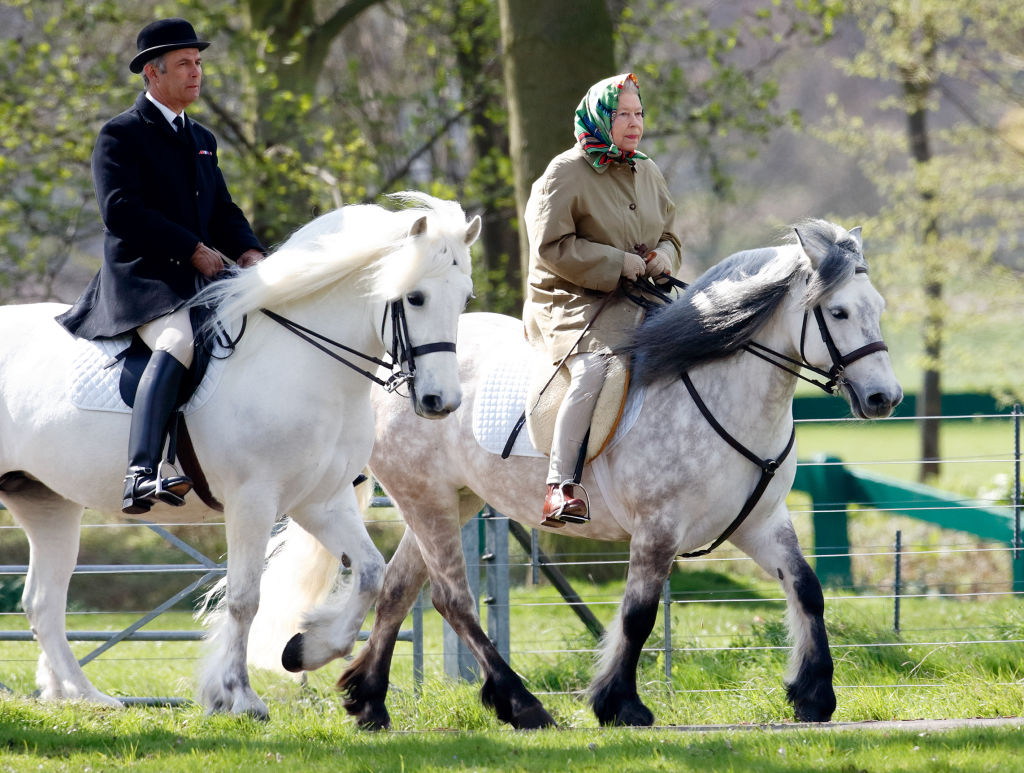
When Elizabeth I purportedly delivered her historic battle-speech on the eve of the Spanish Armada – “I know I have the body of a weak and feeble woman; but I have the heart and stomach of a king, and of a king of England too” – she did so astride a horse; an animal which some historians suggest helped her cement her authority via the animal’s association with both masculine and feminine traits.
Yet more than four centuries later, as Elizabeth II celebrates her Platinum jubilee in the midst of a cost-of-living crisis, horses are a much more troubled symbol. Too posh, too out-of-touch, and too downright wacky – this was the online response to the Queen’s recent birthday photograph, which featured the monarch standing diminutively between the flanks of two pure-white fell ponies. “Leave the Queen to cosplay Lord of the Rings in peace,” my colleague Rachel Cunliffe wrote entertainingly at the time.
For those who believe the monarchy’s time is up, such changing perceptions of the royals’ equines are perhaps of little concern. But from the polo-playing obsession of Princes Charles, Prince William and Prince Harry, to the eventing prowess of Princess Anne and her daughter Zara Phillips Tindall, the Queen has passed her horsey obsession down the regal line – including, the Times reports, to the Duke and Duchess of Cambridge’s children.
So in one of the most nature-depleted nations in the world, has the royal family’s love of horses become an emblem of a hierarchical relationship to nature that is worryingly outdated in an era of environmental crisis?
“A horse is a great equaliser,” goes a quote attributed to Buck Brannaman, one of the world’s most renowned horse trainers, “he doesn’t care how good looking you are, or how rich you are, or how powerful you are; he takes you for how you make him feel.” From looking at photos of the young queen cheering on her racehorses with ecstatic abandon, it’s easy to imagine how Elizabeth-the-woman welcomes the escape a horse’s gaze offers from the crown’s absurd othering.
There is a softness in close bonds formed with non-human beings that is removed from the trappings of pomp and circumstance. In a interview about gardening, Prince Charles urged people to “rediscover ways in which to live as a part of nature,” even admitting that he talks to plants. It is a philosophy that chimes with both the thinking of natural horsemanship advocates (who tame horses based on the study of wild behaviour), and modern environmental greats, such as the US essayist Wendell Berry, who wrote “the earth is what we all have in common”.
Such affinity also tallies with traditions of royal land-stewardship. Look closer at the birthday portrait, for instance, and you’ll see these are not Shadowfax-style warhorses, but native fell ponies from Cumbria, the society for which the Queen is patron. This is a breed that has pulled Viking ploughs and medieval wool-wagons, and is now making a come-back in the trend for rewilding – with their grazing habits much better adapted to cultivating biodiversity than non-native sheep’s rapacious mouths.
There is perhaps an echo of the royal support for focused, individual conservation projects – from Princess Charlotte help in counting butterflies, to her father William’s EarthShot Prize, which has already awarded funding to coral farmers and gorilla protection.
Yet there is another side to both the history of horsemanship and royal environmentalism; one that leans more towards top-down domination, and to management based on precedent rather than need.
As the campaign group Wild Card points out, there has arguably “never been a more critical time” for the royal family to improve the biodiversity of its estates. A recent report from the International Panel on Climate Change states that the world urgently needs to restore and protect 30 to 50 per cent of the Earth’s habitats – yet just 12 per cent of the Royal’s Sandringham Estate has been put aside to provide “priority habitats”. Within the Duchy of Cornwall, Wild Card adds, Prince Charles owns 135,000 acres of land, but only 6 per cent is wooded, compared to the UK wide figure of 13 per cent (and 38 per cent in the EU).
Grouse-shooting and deer-stalking, pastimes the royal family has helped popularise over the years, are also widely acknowledged to have had ruinous impacts on upland landscapes. The practices lead to the laying of traps for raptors, stoats and other predators, as well as the “rotational burning” of moorland heather. A lot of such moors are peatlands that, if protected, provide the biggest natural carbon store on UK land, but a recent investigation found that burning has continued despite a government ban. The Goathland Estate was a signatory to a 2018 cessation of burning on protected blanket bog, reports the land rights campaigner and author Guy Shrubsole, but its Whitewell grouse moor was “conspicuous by its absence”.
“They talk a good talk about biodiversity,” says Alex Lees, a senior lecturer in biodiversity at Manchester Metropolitan University, of the royal’s environmental record as a whole, especially with regard to their advocacy for international climate action. “But they have a very real opportunity to do better.” The royal family recently turned down a request to meet Wild Card to discuss rewilding their land, the campaign group says – despite a letter signed by more than 100 experts and public figures, from Chris Packham to Rowan Williams, asking them to help tackle the nation’s biodiversity demise.
Fifty per cent of Britain is owned by just 1 per cent of the population — the aristocracy, corporations and oligarchs. It matters, therefore, how this elite institution approaches conservation. The royal horses that assembled this weekend to take part in the Jubilee pageant represent a complex legacy – one that offers a reminder of our deep and long-running connection to nature in the British Isles, as well as the negligence and decline that such a highly concentrated system of land ownership has wrought.




